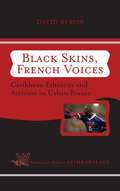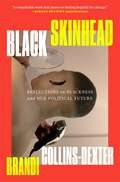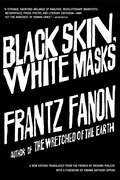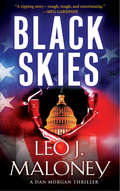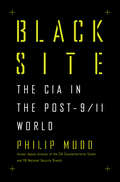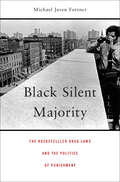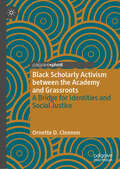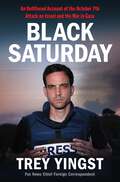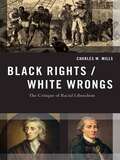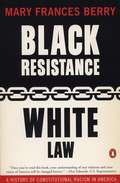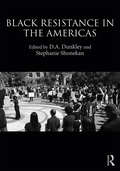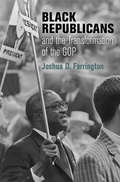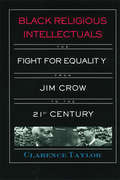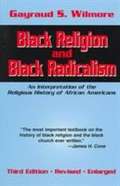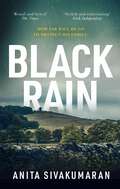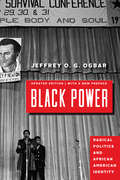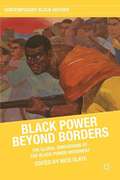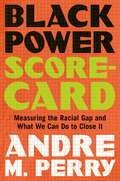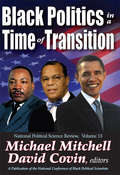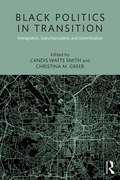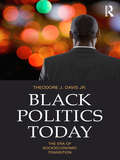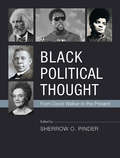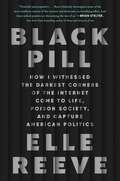- Table View
- List View
Black Skins, French Voices: Caribbean Ethnicity and Activism in Urban France
by David BerissAbout 337,000 people of French Antillean Origin live in metropolitan France today. Unlike immigrants from North Africa, Turkey or sub-Saharan Africa, Antilleans are French citizens with deep roots in
Black Skinhead: Reflections on Blackness and Our Political Future
by Brandi Collins-Dexter"Political activist Collins-Dexter’s essay collection is timely as well as pointed. In it, she argues that Democrats have taken Black voters for granted, and that the consequences of this mistake have already begun — and will accelerate."—The New York Times,"15 Works of Nonfiction to Read This Fall"For fans of Bad Feminist and The Sum of Us, Black Skinhead sparks a radical conversation about Black America and political identity.In Black Skinhead, Brandi Collins-Dexter, former Senior Campaign Director for Color Of Change, explores the fragile alliance between Black voters and the Democratic party. Through sharp, timely essays that span the political, cultural, and personal, Collins-Dexter reveals decades of simmering disaffection in Black America, told as much through voter statistics as it is through music, film, sports, and the baffling mind of Kanye West.While Black Skinhead is an outward look at Black votership and electoral politics, it is also a funny, deeply personal, and introspective look at Black culture and identity, ultimately revealing a Black America that has become deeply disillusioned with the failed promises of its country.----------------------------------------------------We had been told that everything was fine, that America was working for everyone and that the American Dream was attainable for all. But for those who had been paying attention, there had been warning signs that the Obamas’ version of the American Dream wasn’t working for everyone. That it hadn’t been working for many white Americans was immediately and loudly discussed, but the truth—and what I set out to write this book about—was that it hadn’t been working for many Black Americans either. For many, Obama’s vision had been more illusion than reality all along.When someone tells you everything is fine, but around you, you see evidence that it’s not, where will the quest to find answers lead you? As I went on the journey of writing this book, I found a very different tale about Black politics and Black America, one that countered white America’s long-held assumption that Black voters will always vote Democrat—and even that the Democratic party is the best bet for Black Americans. My ultimate question was this: how are Black people being led away—not towards—each other, and what do we lose when we lose each other? What do we lose when, to quote Kanye West, we feel lost in the world.
Black Skin, White Masks
by Frantz FanonThe new translation of the classic work by the author of Wretched of the Earth: &“A strange, haunting mélange of analysis [and] revolutionary manifesto&” (Newsweek). Few modern voices have had as profound an impact on the black identity and critical race theory as Frantz Fanon, and Black Skin, White Masks represents some of his most important work. This new translation by Richard Philcox makes Fanon&’s masterwork accessible to a new generation of readers. It also includes a foreword by philosopher Kwame Anthony Appiah. A major influence on civil rights, anti-colonial, and black consciousness movements around the world, Black Skin, White Masks is the unsurpassed study of the black psyche in a white world. Hailed for its scientific analysis and poetic grace when it was first published in 1952, the book remains a vital force today from one of the most important theorists of revolutionary struggle, colonialism, and racial difference in history.
Black Skies (A Dan Morgan Thriller #3)
by Leo J. Maloney"A ripping story--rough, tough, and entertaining." --Meg Gardiner"Maloney is the new master of the modern spy game." --Mark SullivanIn his most explosive thriller to date, Black Ops veteran Leo J. Maloney goes deep inside a vast global conspiracy bent on the annihilation of the United States--by land, by sea, and by air. . .Black SkiesA team of Navy SEALs wiped out in a surprise attack. A motorcade of dignitaries ambushed--and the U.S. Secretary of State abducted. But this is no random act of terror. A vision of evil unprecedented in scope has been triggered. The enemy will not stop until the skies over America are black with death and destruction. CIA veterans Dan Morgan and Peter Conley--code names Cobra and Cougar--are America's last chance at averting an unthinkable scenario of bloodshed . . . Praise for Leo J. Maloney's Novels "Everything a thriller reader wants."--Ben Coes on Silent Assassin"This is one outstanding thriller."--John Gilstrap on Termination Orders"High-powered. . .tense and terrifying!"--Hank Phillippi Ryan on Termination Orders93,500 Words
Black Site: The Cia In The Post-9/11 World
by Philip MuddA bold account of one of the most controversial and haunting initiatives in American history, Black Site tells the full story of the post-9/11 counterterrorism world at the CIA. When the towers fell on September 11, 2001, nowhere were the reverberations more powerfully felt than at CIA headquarters in Langley, Virginia. Almost overnight, the intelligence organization evolved into a warfighting intelligence service, constructing what was known internally as “the Program”: a web of top-secret detention facilities intended to help prevent future attacks on American soil and around the world. With Black Site, former deputy director of the CIA Counterterrorist Center Philip Mudd presents a full, never-before-told story of this now-controversial program, directly addressing how far America went to pursue al-Qa’ida and prevent another catastrophe. Heated debates about torture were later ignited in 2014 after the US Senate published a report of the Program, detailing the CIA’s use of “enhanced interrogation techniques” to draw information from detainees. The report, Mudd posits, did not fully address key questions: How did the officials actually come to their decisions? What happened at the detention facilities—known as “Black Sites”—on a day-to-day basis? What did they look like? How were prisoners transported there? And how did the officers feel about what they were doing? Black Site seeks answers to these questions and more, first by examining pre-9/11 Langley, when the CIA was tasked with collecting, disseminating, and analyzing information related to overseas events. Mudd argues that September 12, 2001, marked an operational revolution, as officials suddenly felt the weight of protecting a nation from a second wave of attacks inside the United States. Re-creating the incredibly tense atmosphere of the time, Mudd reveals that many officials felt an unshakable personal responsibility to thwart another attack. Based on interviews from dozens of officials—many of whom have never spoken out before— Black Site illuminates how the Agency quickly stepped into the process of organizing a full-blown interrogation program. Mudd offers a deeper understanding of how the enhanced interrogation techniques were developed and how intelligence professionals prepared to talk to the world’s most hardened terrorists. With careful detail, he takes us through the process of each legally approved technique, including waterboarding. As compelling as it is revelatory, Black Site shows us the tragedy and triumph of the CIA during its most difficult days.
Black Silent Majority: The Rockefeller Drug Laws and the Politics of Punishment
by Michael Javen FortnerCurrent anti-drug policies are based on a set of controversial laws first adopted in New York in the early 1970s and championed by the state’s Republican governor, Nelson Rockefeller. Fortner traces how many blacks in New York came to believe that the rehabilitation-focused liberal policies of the 1960s had failed. Faced with economic malaise and rising rates of addiction and crime, they blamed addicts and pushers. By 1973, the outcry from grassroots activists and civic leaders in Harlem calling for drastic measures presented Rockefeller with a welcome opportunity to crack down on crime and boost his political career. New York became the first state to mandate long prison sentences for selling or possessing narcotics. Black Silent Majority lays bare the tangled roots of a pernicious system. America’s drug policies, while in part a manifestation of the conservative movement, are also a product of black America’s confrontation with crime and chaos in its own neighborhoods.
Black Silent Majority: The Rockefeller Drug Laws and the Politics of Punishment
by Michael Javen FortnerAggressive policing and draconian sentencing have disproportionately imprisoned millions of African Americans for drug-related offenses. Michael Javen Fortner shows that in the 1970s these punitive policies toward addicts and pushers enjoyed the support of many working-class and middle-class blacks, angry about the chaos in their own neighborhoods.
Black Scholarly Activism between the Academy and Grassroots: A Bridge for Identities and Social Justice
by Ornette D. ClennonThis book explores the 'invisible' impact whiteness has on the lived 'black' experience in the UK. Using education as a philosophical and ethical framework, the author interrogates the vision of Black Radicalism proposed by Kehinde Andrews, exploring its potential applicability to grassroots activism. Clennon uses an interdisciplinary theoretical framework to draw together his previous writings on 'blackness', in effect crystallising the links between commercial (urban) blackness, the pathological structures of whiteness and institutional control. Drawing inspiration from Robbie Shilliam's cosmologically related 'hinterlands' as an antidote to the nature of colonial (Eurocentric) epistemologies, the author uses the polemical chapters as gateways to theoretical discussion about the material effects of whiteness felt on the ground. This controversial and unflinching volume will be of interest to students and scholars of race studies, particularly within education, and the lived black experience.
Black Saturday: An Unfiltered Account of the October 7th Attack on Israel and the War in Gaza
by Trey YingstFox News war correspondent Trey Yingst shares his gripping, firsthand account of the events of October 7, 2023, and the ensuing war, offering riveting insight and fresh facts that clarify the scope and magnitude of this latest and most dramatic outbreak in one of the bloodiest, most nuanced, and longest-standing conflicts in modern history. <P><P> On the morning of October 7, 2023, the militant group known as Hamas launched a vicious attack on Israel in the most recent stage of the deeply complicated and decades-long Israel-Palestine conflict. The assault, which took place on Shabbat—the day of rest for the Jewish people—instantly became known among Israelis and the world as “Black Saturday.” <P><P> On October 7, Fox News Correspondent Trey Yingst was on the ground along the Gaza border and witnessed firsthand the devastation, shock, and deep sorrow that whirled through Israel. A seasoned journalist who has reported from some of the most dangerous hotspots around the world, including the frontlines in Ukraine, Afghanistan, and Pakistan, Yingst was just one among many people plunged into the terrifying chaos of that horrific event. In this shocking and eye-opening chronicle, he pieces together the story of that tragic day and reveals how he risked his life searching for answers to essential questions in real time--who within Israel had been attacked; what happened to them; who, potentially, was next--while exploring the impact on both Israelis and Palestinians as a full-scale war ramps up and peace grows more elusive. “We have a responsibility now to account for and record these events—and tell the world the truth,” Yingst writes. “We cannot look away.” <P><P> Committed to reporting the whole truth, on both sides of the Israel-Gaza border, Yingst interviewed a range of exclusive contacts to incorporate multiple perspectives. From conversations with Israeli Defense Minister Yoav Gallant and high-ranking soldiers, to interviews with Senior Hamas official Dr. Bassem Naim and Gazan journalist Nael Ghaboun, to heartbreaking accounts from civilians placed in the crosshairs of the attack and conflict that followed, Yingst takes us inside the newest phase of an old war in which thousands more people—men, women, and children—are suffering. <P><P> Combining candor, grit, and veracity, Yingst paints a vivid picture of horrors and violence, matched by acts of courage and humanity that cut through the darkness. A testament to unwavering resilience and tenacity, Black Saturday is the riveting chronicle of one journalist’s experience relentlessly pursuing the truth in the face of terror. <P><P> Black Saturday will include a 16-pages of full-color photographs. <p> <b>New York Times Bestseller</b>
Black Rights/white Wrongs: The Critique Of Racial Liberalism (Transgressing Boundaries: Studies In Black Politics And Black Communities Ser.)
by Charles W. MillsLiberalism is the political philosophy of equal persons, yet liberalism has denied equality to those it saw as black sub-persons. In Black Rights/White Wrongs: The Critique of Racial Liberalism, political philosopher Charles Mills challenges mainstream accounts that ignore this history and its current legacy in the United States today
Black Resistance, White Law: A History of Constitutional Racism in America
by Mary Frances BerryHow the government has used the Constitution to deny black Americans their legal rights From the arrival of the first twenty slaves in Jamestown to the Howard Beach Incident of 1986, Yusef Hawkins, and Rodney King, federal law enforcement has pleaded lack of authority against white violence while endorsing surveillance of black rebels and using "constitutional" military force against them. In this groundbreaking study, constitutional scholar Mark Frances Berry analyzes the reasons why millions of African Americans whose lives have improved enormously, both socially and economically, are still at risk of police abuse and largely unprotected from bias crimes.
Black Resistance in the Americas
by Stephanie Shonekan D. A. DunkleyAll across the US in the last few years, there has been a resurgence of Black protest against structural racism and other forms of racial injustice. Black Resistance in the Americas draws attention to this renewed energy and how this theme of resistance intersects with other communities of Black people around the world. This edited collection examines in depth stories of resistance against slavery, narratives of resistance in African American, Afro-Caribbean, and Afro-Latin American Literature, resistance in politics, education, religion, music, dance, and film, exploring a range of new perspectives from established and emerging researchers on Black communities. The essays in this pivotal book discuss some of the mechanisms that Black communities have used to resist bondage, domination, disempowerment, inequality, and injustices resulting from their encounters with the West, from colonization to forced migration.
Black Republicans and the Transformation of the GOP
by Joshua D. FarringtonReflecting on his fifty-year effort to steer the Grand Old Party toward black voters, Memphis power broker George W. Lee declared, "Somebody had to stay in the Republican Party and fight." As Joshua Farrington recounts in his comprehensive history, Lee was one of many black Republican leaders who remained loyal after the New Deal inspired black voters to switch their allegiance from the "party of Lincoln" to the Democrats.Ideologically and demographically diverse, the ranks of twentieth-century black Republicans included Southern patronage dispensers like Lee and Robert Church, Northern critics of corrupt Democratic urban machines like Jackie Robinson and Archibald Carey, civil rights agitators like Grant Reynolds and T. R. M. Howard, elected politicians like U.S. Senator Edward W. Brooke and Kentucky state legislator Charles W. Anderson, black nationalists like Floyd McKissick and Nathan Wright, and scores of grassroots organizers from Atlanta to Los Angeles. Black Republicans believed that a two-party system in which both parties were forced to compete for the African American vote was the best way to obtain stronger civil rights legislation. Though they were often pushed to the sidelines by their party's white leadership, their continuous and vocal inner-party dissent helped moderate the GOP's message and platform through the 1970s. And though often excluded from traditional narratives of U.S. politics, black Republicans left an indelible mark on the history of their party, the civil rights movement, and twentieth-century political development.Black Republicans and the Transformation of the GOP marshals an impressive amount of archival material at the national, state, and municipal levels in the South, Midwest, and West, as well as in the better-known Northeast, to open up new avenues in African American political history.
Black Religious Intellectuals: The Fight for Equality from Jim Crow to the 21st Century (Crosscurrents in African American History)
by Clarence TaylorProfessor Clarence Taylor sheds some much-needed light on the rich intellectual and political tradition that lies in the black religious community. From the Pentecostalism of Bishop Smallwood Williams and the flamboyant leadership of the Reverend Al Sharpton, to the radical Presbyterianism of Milton Arthur Galamison and the controversial and mass-mobilization by Minister Louis Farrakhan, black religious leaders have figured prominently in the struggle for social equality in America.
Black Religion and Black Radicalism: An Interpretation of the Religious History of African Americans
by Gayraud S. WilmoreIn this classic treatment of African American religious history, Wilmore shows to what extent the history of African Americans can be told in terms of religion, and to what extent this religious history has been inseparably bound to the struggle for freedom and justice. From the story of the slave rebellions and emancipation, to the rise of Black nationalism and the freedom struggles of recent times, up through the development of Black, womanist, and Afrocentric theologies, Wilmore offers an essential interpretation of African American religious history.
Black Rain: An utterly addictive crime thriller with breathtaking suspense (Detective Vijay Patel #2)
by Anita SivakumaranGazing out into the glowing curtain of evening summer rain, his body floods with fear as a cold hand clamps over his mouth. He doesn't even have a chance to scream as he is pulled down into the dark.When actor Majid Rahman's body is found in a neighbourhood allotment in Leicester, Detective Vijay Patel is one of the first on the scene, but is unable to save the man. Although his mother's house backs onto the gardens, he resolves to let the local police do their work.But after a neighbour is kidnapped and the detective in charge doesn't want to know, Patel vows to find the killer.When Patel uncovers a leather bag stuffed with money and a gold necklace near to where Majid's body was found, he realises this case may be a lot bigger than he'd imagined. Just as he starts to get close to the truth, the witness he was hoping to speak to is shot in front of him, and Patel must flee for his life.Just when Patel is finally on the killer's trail, he finds a clue that shocks him to his very core: this case may be closer to home than he ever could have imagined. Could stopping this twisted killer from stealing more lives mean paying the ultimate price for Patel?A totally gripping crime thriller, packed with suspense and twists you'll never see coming. Fans of Ian Rankin, Abir Mukherjee and Val McDermid will be utterly addicted.What readers are saying about Anita Sivakumaran:'Wow just incredible... The killer's identity just took my breath away... Breathtaking suspense and mystery that will blow you away... Outstanding. ⭐⭐⭐⭐⭐' Surjit's Book Blog⭐⭐⭐⭐⭐'Wow, wow, wow. I just couldn't put this one down. An absolute masterpiece. Gritty, fast paced, brilliant... Loved loved all the characters... One of the best crime books I have ever read. Just wonderful. Will be recommending this to everyone.' Bestselling author Renita D'Silva ⭐⭐⭐⭐⭐'Absolutely gripping... So intense... The twists I encountered along the way were so unexpected... I could not stop to put this down at any point... Gave me tingles... I was so nervous about how this book was going to play out.' Twilight Reader ⭐⭐⭐⭐⭐'Completely pulled in... I have devoured this book in one sitting.' Little Miss Book Lover 87'Twisty... I didn't guess the denouement at all, even as the book was racing towards its conclusion.' The Quick and the Read'Exciting... A super-gripping new thriller series... You'll be kept guessing as to the killer's identity throughout... Will have you totally hooked.' Cosmopolitan'Gripping... Very well drawn characters... Recommended!' NetGalley Reviewer'Fast-paced and riveting.' Beyond the Books'Anita Sivakumaran is an exciting new name in crime fiction.' The Times
Black Rain: An utterly addictive crime thriller with breathtaking suspense (Detective Vijay Patel #2)
by Anita SivakumaranGazing out into the glowing curtain of evening summer rain, his body floods with fear as a cold hand clamps over his mouth. He doesn't even have a chance to scream as he is pulled down into the dark.When actor Majid Rahman's body is found in a neighbourhood allotment in Leicester, Detective Vijay Patel is one of the first on the scene, but is unable to save the man. Although his mother's house backs onto the gardens, he resolves to let the local police do their work.But after a neighbour is kidnapped and the detective in charge doesn't want to know, Patel vows to find the killer.When Patel uncovers a leather bag stuffed with money and a gold necklace near to where Majid's body was found, he realises this case may be a lot bigger than he'd imagined. Just as he starts to get close to the truth, the witness he was hoping to speak to is shot in front of him, and Patel must flee for his life.Just when Patel is finally on the killer's trail, he finds a clue that shocks him to his very core: this case may be closer to home than he ever could have imagined. Could stopping this twisted killer from stealing more lives mean paying the ultimate price for Patel?A totally gripping crime thriller, packed with suspense and twists you'll never see coming. Fans of Ian Rankin, Abir Mukherjee and Val McDermid will be utterly addicted.What readers are saying about Anita Sivakumaran:'Wow just incredible... The killer's identity just took my breath away... Breathtaking suspense and mystery that will blow you away... Outstanding. ⭐⭐⭐⭐⭐' Surjit's Book Blog⭐⭐⭐⭐⭐'Wow, wow, wow. I just couldn't put this one down. An absolute masterpiece. Gritty, fast paced, brilliant... Loved loved all the characters... One of the best crime books I have ever read. Just wonderful. Will be recommending this to everyone.' Bestselling author Renita D'Silva ⭐⭐⭐⭐⭐'Absolutely gripping... So intense... The twists I encountered along the way were so unexpected... I could not stop to put this down at any point... Gave me tingles... I was so nervous about how this book was going to play out.' Twilight Reader ⭐⭐⭐⭐⭐'Completely pulled in... I have devoured this book in one sitting.' Little Miss Book Lover 87'Twisty... I didn't guess the denouement at all, even as the book was racing towards its conclusion.' The Quick and the Read'Exciting... A super-gripping new thriller series... You'll be kept guessing as to the killer's identity throughout... Will have you totally hooked.' Cosmopolitan'Gripping... Very well drawn characters... Recommended!' NetGalley Reviewer'Fast-paced and riveting.' Beyond the Books'Anita Sivakumaran is an exciting new name in crime fiction.' The Times
Black Power: Radical Politics and African American Identity
by Jeffrey O. OgbarExploring the profound impact of the Black Power movement on African Americans.Outstanding Academic Title, ChoiceIn the 1960s and 70s, the two most important black nationalist organizations, the Nation of Islam and the Black Panther Party, gave voice and agency to the most economically and politically isolated members of black communities outside the South. Though vilified as fringe and extremist, these movements proved to be formidable agents of influence during the civil rights era, ultimately giving birth to the Black Power movement.Drawing on deep archival research and interviews with key participants, Jeffrey O. G. Ogbar reconsiders the commingled stories of—and popular reactions to—the Nation of Islam, Black Panthers, and mainstream civil rights leaders. Ogbar finds that many African Americans embraced the seemingly contradictory political agenda of desegregation and nationalism. Indeed, black nationalism, he demonstrates, was far more favorably received among African Americans than historians have previously acknowledged. It engendered minority pride and influenced the political, cultural, and religious spheres of mainstream African American life for the decades to come.This updated edition of Ogbar's classic work contains a new preface that describes the book's genesis and links the Black Power movement to the Black Lives Matter movement. A thoroughly updated essay on sources contains a comprehensive review of Black Power–related scholarship. Ultimately, Black Power reveals a black freedom movement in which the ideals of desegregation through nonviolence and black nationalism marched side by side.
Black Power beyond Borders
by Nico SlateBlack Power burst seemingly out of nowhere in 1966 - a maelstrom of racial pride, anger, and violence that threatened the civil rights movement and challenged the very fabric of American society. Or at least that's how many have come to understand the story. In truth, the historical phenomenon of Black Power is older, richer, and more global than is commonly understood. From Harlem and Oakland to India and Israel, it inspired and defined political movements that challenged boundaries throughout the world. In this truly groundbreaking volume, figures as varied as Angela Davis and Stevie Wonder are considered alongside lesser-known Black Power organizations like the Polynesian and Dalit Panthers, illuminating the transnational contours of the Black Power movement.
Black Power Scorecard: Measuring the Racial Gap and What We Can Do to Close It
by Andre M. PerryFrom the creator of “a unified field theory of racism” (NPR’s Planet Money), a dollars-and-cents reckoning of the state of Black America and a new framework to close the power gap Historically, Black Americans’ quest for power has been understood as an attempt to gain equal protections under the law. But power in America requires more than basic democratic freedoms. It is inextricably linked with economic influence and ownership—of one’s self, home, business, and creations. Andre M. Perry draws on extensive research and analysis to quantify how much power Black Americans actually have. Ranging from property, business, and wealth to education, health, and social mobility, Black Power Scorecard moves across the country, evaluating people’s ability to set the rules of the game and calculating how that translates into the ultimate means of power—life itself, and the longevity of Black communities. Along the way, Perry identifies woefully overlooked areas of investment that could close the racial gap and benefit everyone. An expansive take on power supported by documentation and data, Black Power Scorecard is a fresh contribution to the country’s reckoning with structural inequality, one that offers a new approach to redressing it.
Black Politics in a Time of Transition (National Political Science Review Series)
by David CovinBlack Politics in a Time of Transition appears at an historic point in American politics. From the vantage point of the maturation of the study of black politics, this volume provides a framework for current and future discussion of this critical time. Incorporating the expanded stream of work on today's black politics, this latest volume of the National Political Science Review is also a new assessment of the period from which the study of black politics emerged.Selected for this volume are chapters of contemporary relevance alongside those that reconsider an early twentieth- century pioneer in black politics and history, W. E. B. Du Bois. The volume also includes a robust book review section that spans a range of topics from the South's new racial politics to the aftermath of Hurricane Katrina.This volume features work by varied and accomplished scholars, including "Black Power in Black Presidential Bids From Jackson to Obama," Katherine Tate; "'But I Voted for Obama': Melodrama and Post-Civil Rights, Post-Feminist Ideology in Grey's Anatomy, Crash, and Barack Obama's 2008 Presidential Bid," Nikol Alexander-Floyd; "Afro-Brazilian Black Linked Fate in Salvador and Sao Paulo, Brazil," Gladys Mitchell; and "Beyond Tactical Withdrawal: An Early History of the National Conference of Black Political Scientists," Joseph P. McCormick, II.
Black Politics in Transition: Immigration, Suburbanization, and Gentrification (Race, Ethnicity, and Gender in Politics and Policy)
by Candis Watts Smith Christina M. GreerBlack Politics in Transition considers the impact of three transformative forces—immigration, suburbanization, and gentrification—on Black politics today. Demographic changes resulting from immigration and ethnic blending are dramatically affecting the character and identity of Black populations throughout the US. Black Americans are becoming more ethnically diverse at the same time that they are sharing space with newcomers from near and far. In addition, the movement of Black populations out of the cities to which they migrated a generation ago—a reverse migration to the American South, in some cases, and in other cases a movement from cities to suburbs shifts the locus of Black politics. At the same time, middle class and white populations are returning to cities, displacing low income Blacks and immigrants alike in a renewal of gentrification. All this makes for an important laboratory of discovery among social scientists, including the diverse range of authors represented here. Drawing on a wide array of disciplinary perspectives and methodological strategies, original chapters analyze the geography of opportunity for Black Americans and Black politics in accessible, jargon-free language. Moving beyond the Black–white binary, this book explores the tri-part relationship among Blacks, whites, and Latinos as well. Some of the most important developments in Black politics are happening at state and local levels today, and this book captures that for students, scholars, and citizens engaged in this dynamic milieu.
Black Politics Today: The Era of Socioeconomic Transition (Routledge Series on Identity Politics)
by Theodore J. Davis Jr.The late 1980s ushered in a new era of black politics, the socioeconomic transition era. Coming on the heels of the protest era and politics era, the current stage is characterized by the emergence of a new black middle class that came of age after the Civil Rights struggle. Although class still isn’t a strong factor in the external politics of the black community, it is increasingly a wedge issue in the community’s internal politics. Black politics today is increasingly less about the interest of the larger group and more about the interest of smaller subgroups within the community. Theodore J. Davis Jr. argues that the greatest threat to the social and political cohesiveness of the so-called black community may be the rise of a socially and economically privileged group among the ranks of black America. This rift has affected blacks’ ability to organize effectively and influence politics. Davis traces the changes in economic status, public opinion, political power and participation, and leadership over three generations of black politics. The result is an insightful analysis of black politics today.
Black Political Thought: From David Walker to the Present
by Sherrow O. PinderIn Black Political Thought: From David Walker to the Present, Sherrow O. Pinder has brought together the writings and discourses central to black political thought and African American politics, compiling a unique anthology of speeches and articles from over 150 years of African American history. Providing in-depth examinations and critical analyses of topics such as slavery, reconstruction, race and racism, black nationalism and black feminism - from a range of perspectives - students are equipped with a comprehensive and informative account of how these issues have fundamentally shaped and continue to shape black political thinking. Each of the six thematic parts is framed by an introduction written by black scholars working in the field, and a list of further readings. Individual chapters are then enhanced by end-of-chapter questions and author biographies. Written for the interdisciplinary field of black studies, and other social science and humanities disciplines, this textbook offers a unique resource for political scientists, sociologists, historians, feminists, and the general reader of black political thought.
Black Pill: How I Witnessed the Darkest Corners of the Internet Come to Life, Poison Society, and Capture American Politics
by Elle ReeveThis tour de force of investigative journalism—in the vein of The Next Civil War and Why We&’re Polarized—reveals how the battle between the right and left is spilling out from the darkest corners of the internet into the real world with often tragic consequences. Award-winning journalist and CNN correspondent Elle Reeve was not surprised by the insurrection at the Capitol on January 6, 2021. With years of in-depth research and on-the-ground investigative reporting under her belt, Reeve was aware of the preoccupations of the online far right and their journey from the computer to QAnon, militias, and racist groups. At the same time, Reeve saw a parallel growth of counterforces, with citizen vigilantes using new tools and tactics to take down the far right. This ongoing battle, long fought mainly on the internet, had arrived in the real world with greater and greater frequency. With a sharp eye for detail and a dash of dark humor, Reeve explains the origins of this shocking sweep of political violence. Drawing on countless interviews with sources in the white nationalist movement as well as hundreds of as-yet-unseen documents, she takes us on a surreal journey from the darkest corners of the internet to the most significant and chilling scenes of real-world political violence in generations. A stranger-than-fiction odyssey into the dark heart of what American politics has become, Black Pill is necessary reading for any supporter of democracy.
